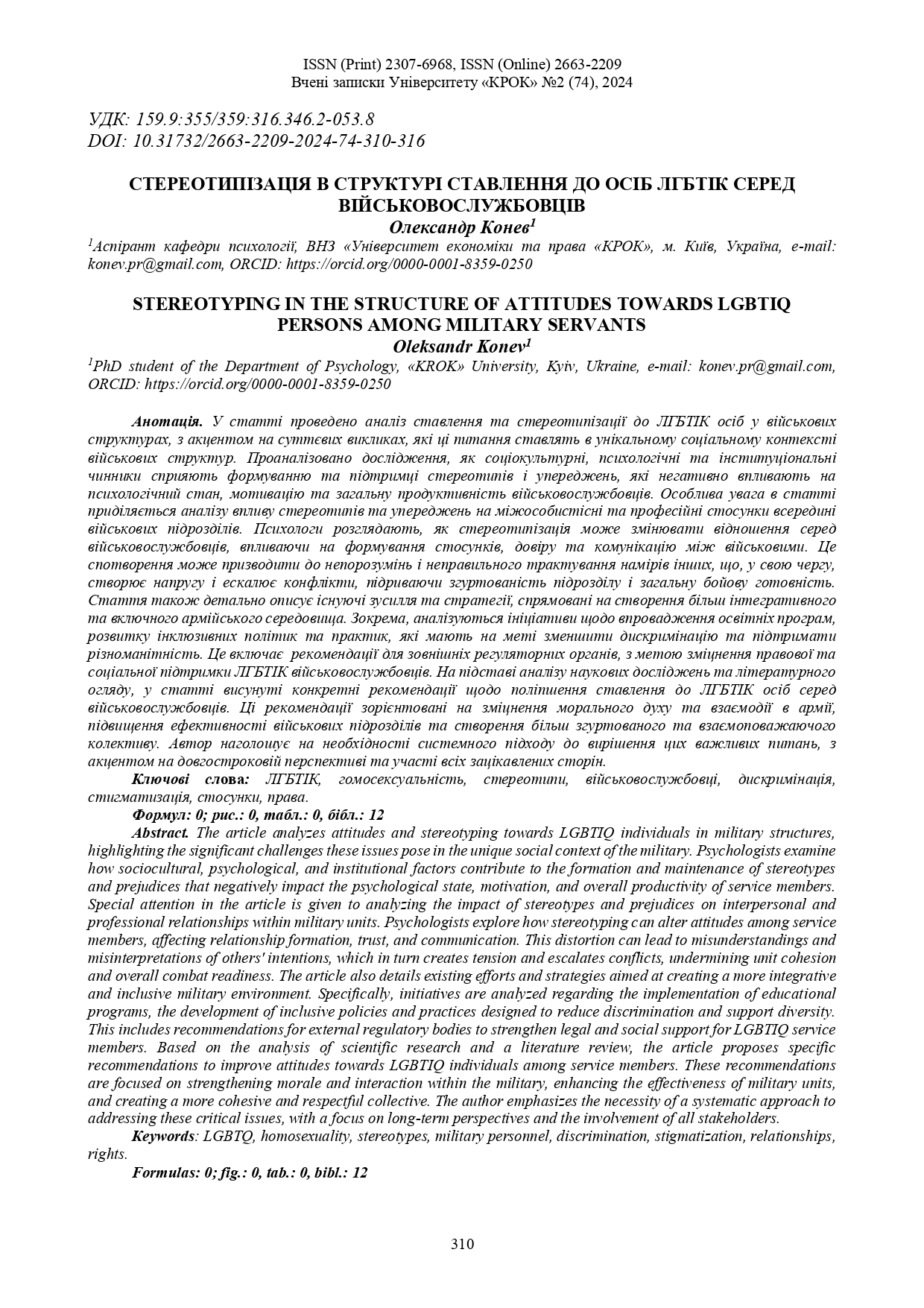STEREOTYPING IN THE STRUCTURE OF ATTITUDES TOWARDS LGBTIQ PERSONS AMONG MILITARY SERVANTS
DOI:
https://doi.org/10.31732/2663-2209-2024-74-323-329Keywords:
LGBTQ, homosexuality, stereotypes, military personnel, discrimination, stigmatization, relationships, rightsAbstract
The article analyzes attitudes and stereotyping towards LGBTIQ individuals in military structures, highlighting the significant challenges these issues pose in the unique social context of the military. Psychologists examine how sociocultural, psychological, and institutional factors contribute to the formation and maintenance of stereotypes and prejudices that negatively impact the psychological state, motivation, and overall productivity of service members. Special attention in the article is given to analyzing the impact of stereotypes and prejudices on interpersonal and professional relationships within military units. Psychologists explore how stereotyping can alter attitudes among service members, affecting relationship formation, trust, and communication. This distortion can lead to misunderstandings and misinterpretations of others' intentions, which in turn creates tension and escalates conflicts, undermining unit cohesion and overall combat readiness. The article also details existing efforts and strategies aimed at creating a more integrative and inclusive military environment. Specifically, initiatives are analyzed regarding the implementation of educational programs, the development of inclusive policies and practices designed to reduce discrimination and support diversity. This includes recommendations for external regulatory bodies to strengthen legal and social support for LGBTIQ service members. Based on the analysis of scientific research and a literature review, the article proposes specific recommendations to improve attitudes towards LGBTIQ individuals among service members. These recommendations are focused on strengthening morale and interaction within the military, enhancing the effectiveness of military units, and creating a more cohesive and respectful collective. The author emphasizes the necessity of a systematic approach to addressing these critical issues, with a focus on long-term perspectives and the involvement of all stakeholders.
Downloads
References
Васильченко, О. М. & Янковська, К. Р. (2017). Особливості ставлення молоді до норм сексуальності: міфологізація та стереотипізація образів гетеро- та гомосексуалів. Правничий вісник Університету «КРОК», (29), 188-196.
Грімова, П. О. (2023). Проблеми та потреби членів ЛГБТ-спільноти, які служать в Збройних силах України (кваліфікаційна бакалаврська робота, Національнии університет «Києво-Могилянська академія»). Доступ через:h
tps://ekmair.ukma.edu.ua/server/api/core/bitstreams/a657caf2-754b-4a68-af76-c73b93560990/content
Харченко, О. І. (2017). Ставлення та стереотипи студентства щодо людей з гомосексуальною орієнтацією. Актуальні проблеми соціології, психології, педагогіки. 2(33), 105-118.
American Psychological Association. (n.d.). Military: Sexual orientation and gender identity. Retrieved from https://www.apa.org/pi/lgbt/resources/military-sexual-orientation
Bailey, M. B., Lee, K & Williams, L. R. (2016). Repealing «Don't Ask Don't Tell»: The impact of stereotypes on attitudes toward homosexuals in the military. American review of politics. (34.)
doi: https://doi.org/10.15763/issn.2374-7781.2013.34.0.85-102
Earnshaw, V. A., Logie, C., Wickersham, J. A. & Kamarulzaman, A. (2024). LGBTQ Stigma. In: Hwahng, S.J., Kaufman, M.R. (eds) Global LGBTQ Health. Global LGBTQ Health. Springer, 15-44.
doi: https://doi.org/10.1007/978-3-031-36204-0_2
Elliott-Dorans, L. (2020). LGBT Military Service in the United States. In D. P. Haider-Markel (Ed.), The Oxford Encyclopedia of LGBT Politics and Policy. Oxford University Press. Retrieved from https://oxfordre.com/politics/display/10.1093/acrefore/9780190228637.001.0001/acrefore-9780190228637-e-1175
Estrada, A. X., Weiss, D. J. (1999). Attitudes of military personnel toward homosexuals. J Homosex. 37(4). 83-97. doi: 10.1300/J082v37n04_05
Jeffery, D. D., Beymer, M. R., Mattiko M. J. & Shell D. (2021). Health Behavior Differences Between Male and Female U.S. Military Personnel by Sexual Orientation: The Importance of Disaggregating Lesbian, Gay, and Bisexual Groups. Military Medicine, 186(5-6), 556-564.
https://doi.org/10.1093/milmed/usaa539
McNamara, K. A., Lucas, C. L., Goldbach, J. T., Holloway, I. W. & Castro, C. A. (2020) «You Don’t Want to Be a Candidate for Punishment»: a Qualitative Analysis of LGBT Service Member «Outness». Springer Science+Business Media, LLC, part of Springer Nature. doi: https://doi.org/10.1007/s13178-020-00445-x
Moradi, B., & Miller, L. (2010). Attitudes of Iraq and Afghanistan War Veterans toward Gay and Lesbian Service Members. Armed Forces & Society, 36(3), 397–419. https://www.jstor.org/stable/4860889
Polchar, J., Sweijs, T., Martijn, C., & Galdiga, J. (2014). LGBT Military Personnel: A Strategic Vision for Inclusion. The Hague Centre for Strategic Studies. Retrieved from https://hcss.nl/report/lgbt-military-personnel-a-strategic-vision-for-inclusion.

Downloads
Published
How to Cite
Issue
Section
License

This work is licensed under a Creative Commons Attribution-NonCommercial 4.0 International License.

